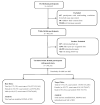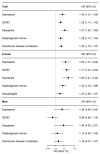The Causal Association of Irritable Bowel Syndrome with Multiple Disease Outcomes: A Phenome-Wide Mendelian Randomization Study
- PMID: 36769754
- PMCID: PMC9918111
- DOI: 10.3390/jcm12031106
The Causal Association of Irritable Bowel Syndrome with Multiple Disease Outcomes: A Phenome-Wide Mendelian Randomization Study
Abstract
Background: This study aimed to identify novel associations between irritable bowel syndrome (IBS) and a broad range of outcomes.
Methods: In total, 346,352 white participants in the U.K. Biobank were randomly divided into two halves, in which a genome-wide association study (GWAS) of IBS and a polygenic risk score (PRS) analysis of IBS using GWAS summary statistics were conducted, respectively. A phenome-wide association study (PheWAS) based on the PRS of IBS was performed to identify disease outcomes associated with IBS. Then, the causalities of these associations were tested by both one-sample (individual-level data in U.K. Biobank) and two-sample (publicly available summary statistics) Mendelian randomization (MR). Sex-stratified PheWAS-MR analyses were performed in male and female, separately.
Results: Our PheWAS identified five diseases associated with genetically predicted IBS. Conventional MR confirmed these causal associations between IBS and depression (OR: 1.07, 95%CI: 1.01-1.14, p = 0.02), diverticular diseases of the intestine (OR: 1.13, 95%CI: 1.08-1.19, p = 3.00 × 10-6), gastro-esophageal reflux disease (OR: 1.09, 95%CI: 1.05-1.13, p = 3.72 × 10-5), dyspepsia (OR: 1.21, 95%CI: 1.13-1.30, p = 9.28 × 10-8), and diaphragmatic hernia (OR: 1.10, 95%CI: 1.05-1.15, p = 2.75 × 10-5). The causality of these associations was observed in female only, but not men.
Conclusions: Increased risks of IBS is found to cause a series of disease outcomes. Our findings support further investigation on the clinical relevance of increased IBS risks with mental and digestive disorders.
Keywords: individual-level Mendelian randomization; irritable bowel syndrome; phenome-wide association study; summary-level Mendelian randomization.
Conflict of interest statement
The authors disclose no conflict of interest.
Figures



References
-
- McPherson Z.E., Sørensen H.T., Horváth-Puhó E., Agar A., Coroneo M.T., White A., Francis I.C., Pasquale L.R., Kang J.H., Pettersson S., et al. Irritable bowel syndrome and risk of glaucoma: An analysis of two independent population-based cohort studies. United Eur. Gastroenterol. J. 2021;9:1057–1065. doi: 10.1002/ueg2.12136. - DOI - PMC - PubMed
Grants and funding
LinkOut - more resources
Full Text Sources

